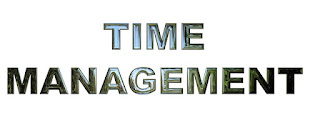Time Management
picture courtesy Google images
You can improve the time management, study skills, and note-taking skills
No matter how you slice it, there are only 24 hours during a day. Time is a finite resource, and it’s up to you to make the most of it. If you lose money, you might get a chance to make it back, but wasted hours is irreplaceable.
picture courtesy Google images
The importance of time management comes down to how much it impacts your personal, educational and professional life. Time management is organising your day in order that you find out the maximum use for each moment. Time management acknowledges you to create a healthy balance in your work and personal life. The result of failed time management includes lost deadlines and living with excessive stress.
Even if you’ve failed to manage your time in the past, it’s never too late to change. Prepare deadlines, get organised, learn to prioritise and master to say ‘no’ where required, to get the most value from your time.
Major 12 ways to improve your time management skills and increase productivity.
Planning
Taking the time to research, and plan your work is crucial for good time management. Allow yourself the time to process new information and plan how you are getting to use it, as this will assist you to avoid having to re-read and repeat any research.One way of effectively planning before researching is to form an inventory of everything you would like to seek out, in order that you will make notes below each subheading as you go.
Prioritise Work
Before the start, make a list of work that needs your immediate attention. Insignificant work can take much of your precious time, and we tend to offer these too much of our energy because they are easier or less stressful.
Create a life schedule
Whether it’s a pin-up planner, a timetable or a calendar on your phone, find an organising tool that works well for you and add your list of priorities there to. There are so many time management apps that can help with this. Also, figure out when you are most alert, in order that you will plan your study periods around these times.Find time for socialising, but also make sure that you get enough sleep. Most people need between 7 to 8 hours sleep nightly to stay focused and alert during study periods.
Set a Deadlines
When you have work at hand, set a deadline and stick to it. Once you set a deadline, it may be helpful to write it on a sticky note and put it near your study space. This will give you a visual impact to keep you on work.
Avoid procrastination
Most students tend to procrastinate tasks till the last moment, which can impact the quality of their work and their overall grade. To make effective use of time, it is important to list out everything that you simply need to do. Include any deadlines also on the list, and make a note of what proportion of time each priority will take. Strictly adhere to the schedule prepared.
Be flexible but realistic
As a student, you must make a timetable for your studies, including the time you spend in seminars and lectures. It’s also important to recollect that things often take longer than expected. So, allow some extra time just in case you spend longer on a task than you thought you would not.
Avoid hesitation and obstruction
One way to avoid hesitation is to think about the different places and ways you got the most use of your time when studying – where were you the most studied? Is there anything you will do to make studying actually somewhat enjoyable?
Remember, what works for one person would not necessarily work for you. Some students, studying with friends can limit their output. But for some other students, studying in groups can help to extend output and motivation.
Analyse your schedule
Constantly analysing and reassessing whether your schedule has been effective can help more to recognise whether you need to make any changes in order to help you complete any academic tasks and also to spend time with friends and family.
Note-taking is an important skill
Effective note-taking is an important skill, a skill that can be applied in all aspects of life, socially, at work and during study. Note-taking may be a powerful aid to communication, how to summarise and retain the key points from what you’ve heard and understood.
Think about whether or not to some extent is noteworthy before you write it down; do not take notes for the sake of taking notes. Otherwise you’ll end up with lots of irrelevant points, which will distract you from the important things. You probably only actually need to form notes on things that are new to you.
Avoid Multitasking
Most students feel that multitasking is an efficient way of getting things done, but the truth is that we do better once we focus and consider one thing. Multitasking hampers capacity and should be avoided to improve time management skills.
Start Early
When you wake up early, you are more calm, creative, and clear-headed. As the day progresses, your energy levels start to drain, which affects your productivity, motivation, and focus.
Learn to Say No
Politely refuse to accept extra work, if you think that you’re already overloaded with work. Take a glance at your list before agreeing to an extra work.




Nice
ReplyDeleteNice!
ReplyDeleteVery informative
ReplyDeletevery nice
ReplyDeleteyour blog theme system not nice open a blog WordPress and use theme | astra | astra is nice thime
ReplyDeletegood one
ReplyDelete